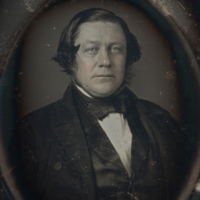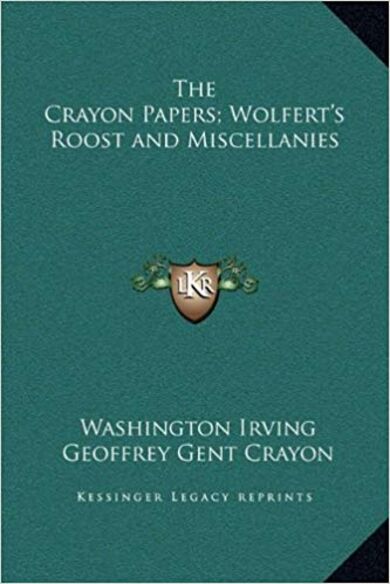
During a summer’s residence in the old Moorish palace of the Alhambra, of which I have already given numerous anecdotes to the public, I used to pass much of my time in the beautiful hall of the Abencerrages, beside the fountain celebrated in the tragic story of that devoted race. Here it was, that thirty-six cavaliers of that heroic line were treacherously sacrificed, to appease the jealousy or allay the fears of a tyrant. The fountain which now throws up its sparkling jet, and sheds a dewy freshness around, ran red with the noblest blood of Granada, and a deep stain on the marble pavement is still pointed out, by the cicerones of the pile, as a sanguinary record of the massacre. I have regarded it with the same determined faith with which I have regarded the traditional stains of Rizzio’s blood on the floor of the chamber of the unfortunate Mary, at Holyrood. I thank no one for endeavoring to enlighten my credulity, on such points of popular belief. It is like breaking up the shrine of the pilgrim; it is robbing a poor traveller of half the reward of his toils; for, strip travelling of its historical illusions, and what a mere fag you make of it!
For my part, I gave myself up, during my sojourn in the Alhambra, to all the romantic and fabulous traditions connected with the pile. I lived in the midst of an Arabian tale, and shut my eyes, as much as possible, to every thing that called me back to every-day life; and if there is any country in Europe where one can do so, it is in poor, wild, legendary, proud-spirited, romantic Spain; where the old magnificent barbaric spirit still contends against the utilitarianism of modern civilization.
In the silent and deserted halls of the Alhambra; surrounded with the insignia of regal sway, and the still vivid, though dilapidated traces of oriental voluptuousness, I was in the strong-hold of Moorish story, and every thing spoke and breathed of the glorious days of Granada, when under the dominion of the crescent. When I sat in the hall of the Abencerrages, I suffered my mind to conjure up all that I had read of that illustrious line. In the proudest days of Moslem domination, the Abencerrages were the soul of every thing noble and chivalrous. The veterans of the family, who sat in the royal council, were the foremost to devise those heroic enterprises, which carried dismay into the territories of the Christians; and what the sages of the family devised, the young men of the name were the foremost to execute. In all services of hazard; in all adventurous forays, and hair-breadth hazards; the Abencerrages were sure to win the brightest laurels. In those noble recreations, too, which bear so close an affinity to war; in the tilt and tourney, the riding at the ring, and the daring bull-fight; still the Abencerrages carried off the palm. None could equal them for the splendor of their array, the gallantry of their devices; for their noble bearing, and glorious horsemanship. Their open-handed munificence made them the idols of the populace, while their lofty magnanimity, and perfect faith, gained them golden opinions from the generous and high-minded. Never were they known to decry the merits of a rival, or to betray the confidings of a friend; and the “word of an Abencerrage” was a guarantee that never admitted of a doubt.
And then their devotion to the fair! Never did Moorish beauty consider the fame of her charms established, until she had an Abencerrage for a lover; and never did an Abencerrage prove recreant to his vows. Lovely Granada! City of delights! Who ever bore the favors of thy dames more proudly on their casques, or championed them more gallantly in the chivalrous tilts of the Vivarambla? Or who ever made thy moon-lit balconies, thy gardens of myrtles and roses, of oranges, citrons, and pomegranates, respond to more tender serenades?
I speak with enthusiasm on this theme; for it is connected with the recollection of one of the sweetest evenings and sweetest scenes that ever I enjoyed in Spain. One of the greatest pleasures of the Spaniards is, to sit in the beautiful summer evenings, and listen to traditional ballads, and tales about the wars of the Moors and Christians, and the “buenas andanzas” and “grandes hechos,” the “good fortunes” and “great exploits” of the hardy warriors of yore. It is worthy of remark, also, that many of these songs, or romances, as they are called, celebrate the prowess and magnanimity in war, and the tenderness and, fidelity in love, of the Moorish cavaliers, once their most formidable and hated foes. But centuries have elapsed, to extinguish the bigotry of the zealot; and the once detested warriors of Granada are now held up by Spanish poets, as the mirrors of chivalric virtue.
Such was the amusement of the evening in question. A number of us were seated in the Hall of the Abencerrages, listening to one of the most gifted and fascinating beings that I had ever met with in my wanderings. She was young and beautiful; and light and ethereal; full of fire, and spirit, and pure enthusiasm. She wore the fanciful Andalusian dress; touched the guitar with speaking eloquence; improvised with wonderful facility; and, as she became excited by her theme, or by the rapt attention of her auditors, would pour forth, in the richest and most melodious strains, a succession of couplets, full of striking description, or stirring narration, and composed, as I was assured, at the moment. Most of these were suggested by the place, and related to the ancient glories of Granada, and the prowess of her chivalry. The Abencerrages were her favorite heroes; she felt a woman’s admiration of their gallant courtesy, and high-souled honor; and it was touching and inspiring to hear the praises of that generous but devoted race, chanted in this fated hall of their calamity, by the lips of Spanish beauty.
Among the subjects of which she treated, was a tale of Moslem honor, and old-fashioned Spanish courtesy, which made a strong impression on me. She disclaimed all merit of invention, however, and said she had merely dilated into verse a popular tradition; and, indeed, I have since found the main facts inserted at the end of Conde’s History of the Domination of the Arabs, and the story itself embodied in the form of an episode in the Diana of Montemayor. From these sources I have drawn it forth, and endeavored to shape it according to my recollection of the version of the beautiful minstrel; but, alas! what can supply the want of that voice, that look, that form, that action, which gave magical effect to her chant, and held every one rapt in breathless admiration! Should this mere travestie of her inspired numbers ever meet her eye, in her stately abode at Granada, may it meet with that indulgence which belongs to her benignant nature. Happy should I be, if it could awaken in her bosom one kind recollection of the lonely stranger and sojourner, for whose gratification she did not think it beneath her to exert those fascinating powers which were the delight of brilliant circles; and who will ever recall with enthusiasm the happy evening passed in listening to her strains, in the moon-lit halls of the Alhambra.
GEOFFREY CRAYON.



